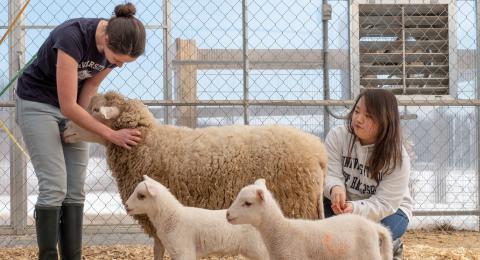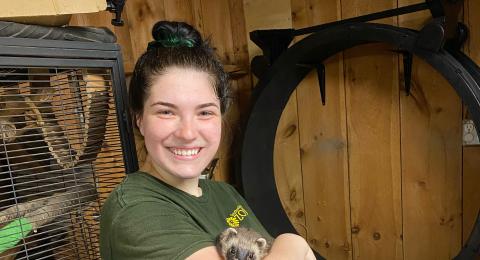About the Animal Science program
The Animal Science major at UNH equips students with the expertise to thrive in diverse careers, from veterinary sciences to agricultural management. You’ll engage in experience-based learning through real-world applications in veterinary sciences and agricultural management. Our curriculum is designed to immerse you in both practical skills and scientific knowledge, preparing you to become a leader in a range of animal health professions.
What is Animal Science?
Animal science is the study of the biology and management of animals and their interaction with the human world. Core courses in this degree include a strong foundation in animal nutrition, reproduction, genetics and physiology, preparing students for a variety of animal-centered careers or further studies in veterinary medicine or graduate school. Further, students can choose from a wide array of electives, delving into topics ranging from individual animal health and management practices to business development.
Why Study Animal Science at UNH?
At UNH, you won’t just learn in the classroom about animal science, you’ll have regular opportunities to gain hands-on experience at our many on-campus animal facilities and through our well-established network of local and regional collaborators. This interactive approach to learning is built into our core and elective curriculum and is augmented by the activities of the student clubs associated with the animal science program. Examples of engaged learning include participating in the Poultry Experiential Education Program (PEEP) or the Cooperative Real Education in Agricultural Management (CREAM) classes and assisting with research projects lead by our faculty and graduate students.
Potential careers
- Animal care and production
- Animal business management
- Biotechnology/Pharmaceutical
- Animal feed industry
- Animal reproduction
- Advocacy and policy consulting
- Government agencies (e.g. USDA)
- Education and Outreach Extension
- Food inspection and safety
- Public health
- Veterinary medicine
Curriculum & Requirements
Animal Science is the study of the biology and management of animals that enhance human life and well-being. Completion of the Animal Science B.S. is designed to prepare students for a variety of animal-focused careers. Students in our major can work with a wide variety of animal species as part of the curriculum, from dairy cattle to chickens to small animals. Our program allows students to gain a scientific understanding of animals while exploring the many career options in animal management.
The Animal Science B.S. is one of many pathways for admission to veterinary school. Because admission to veterinary school is highly competitive due to the limited number of available spaces and the high standards for admission, students are advised to choose an academic program that deeply interests them. Simply taking the prerequisite courses required by veterinary schools without considering alternate career goals is not advisable.
Sample Degree Plan
This sample degree plan serves as a general guide; students collaborate with their academic advisor to develop a personalized degree plan to meet their academic goals and program requirements.
| First Year | ||
|---|---|---|
| Fall | Credits | |
| ANSC 421 | Introduction to Animal Science | 4 |
| BIOL 411 | Introductory Biology: Molecular and Cellular | 4 |
| CHEM 403 | General Chemistry I | 4 |
| ENGL 401 | First-Year Writing (WI) or Discovery course (Not SS, FPA, or WC) | 4 |
| Credits | 16 | |
| Spring | ||
| ANSC 406 | Careers in Animal Science | 1 |
| BIOL 412 | Introductory Biology: Evolution, Biodiversity and Ecology | 4 |
| CHEM 404 | General Chemistry II | 4 |
| ENGL 401 | First-Year Writing (or Discovery course) | 4 |
| Elective | 4 | |
| Credits | 17 | |
| Second Year | ||
| Fall | ||
| ANSC 511 | Animal Anatomy and Physiology I | 4 |
| ANSC 612 | Genetics of Animals | 4 |
| Discovery course | 4 | |
| Elective | 4 | |
| Credits | 16 | |
| Spring | ||
| ANSC 512 | Animal Anatomy and Physiology II | 4 |
| ANSC 543 | Technical Writing in Animal Sciences (WI) | 2 |
| BIOL 528 | Applied Biostatistics I | 4 |
| Discovery Course | 4 | |
| Elective | 2 | |
| Credits | 16 | |
| Third Year | ||
| Fall | ||
| ANSC 625 | Animal Diseases | 4 |
| BMS 503 & BMS 504 | General Microbiology and General Microbiology Laboratory | 5 |
| Discovery course | 4 | |
| Elective | 4 | |
| Credits | 17 | |
| Spring | ||
| ANSC 609 | Principles of Animal Nutrition | 4 |
| BMCB 501 | Biological Chemistry | 4 |
| Discovery course | 4 | |
| Elective | 4 | |
| Credits | 16 | |
| Fourth Year | ||
| Fall | ||
| ANSC Reproduction course or Discovery course | 4 | |
| Elective | 4 | |
| Elective | 4 | |
| Elective | 4 | |
| Credits | 16 | |
| Spring | ||
| ANSC 602 | Animal Rights and Societal Issues (WI) | 4 |
| ANSC Reproduction course or Discovery course | 4 | |
| Capstone course | 4 | |
| Elective | 4 | |
| Credits | 16 | |
| Total Credits | 130 | |
ANSC Sample Student Schedule by Semester - Pre-Veterinary/Graduate School Intent
| First Year | ||
|---|---|---|
| Fall | Credits | |
| ANSC 421 | Introduction to Animal Science | 4 |
| BIOL 411 | Introductory Biology: Molecular and Cellular | 4 |
| CHEM 403 | General Chemistry I | 4 |
| ENGL 401 | First-Year Writing (WI) or Discovery course (Not SS, FPA, or WC) | 4 |
| Credits | 16 | |
| Spring | ||
| ANSC 406 | Careers in Animal Science | 1 |
| BIOL 412 | Introductory Biology: Evolution, Biodiversity and Ecology | 4 |
| CHEM 404 | General Chemistry II | 4 |
| MATH 424B | Calculus for Life Sciences | 4 |
| ENGL 401 | First-Year Writing (or Discovery course) | 4 |
| Credits | 17 | |
| Second Year | ||
| Fall | ||
| ANSC 511 | Animal Anatomy and Physiology I | 4 |
| BIOL 528 | Applied Biostatistics I | 4 |
| CHEM 651 & CHEM 653 | Organic Chemistry I and Organic Chemistry Laboratory | 5 |
| Discovery course | 4 | |
| Credits | 17 | |
| Spring | ||
| ANSC 512 | Animal Anatomy and Physiology II | 4 |
| CHEM 652 & CHEM 654 | Organic Chemistry II and Organic Chemistry Laboratory | 5 |
| ENGL 501 | Introduction to Creative Nonfiction (WI and FPA DISC) | 4 |
| Elective | 4 | |
| Credits | 17 | |
| Third Year | ||
| Fall | ||
| ANSC 612 | Genetics of Animals | 4 |
| ANSC 625 | Animal Diseases | 4 |
| BMS 503 & BMS 504 | General Microbiology and General Microbiology Laboratory | 5 |
| Discovery course or Elective | 4 | |
| Credits | 17 | |
| Spring | ||
| ANSC 609 | Principles of Animal Nutrition | 4 |
| BMCB 658 & BMCB 659 | General Biochemistry and General Biochemistry Lab | 5 |
| Discovery course | 4 | |
| Elective | 4 | |
| Credits | 17 | |
| Fourth Year | ||
| Fall | ||
| PHYS 401 | Introduction to Physics I | 4 |
| ANSC Repro Course or Discovery course | 4 | |
| Discovery course or Elective | 4 | |
| Elective | 4 | |
| Credits | 16 | |
| Spring | ||
| ANSC 602 | Animal Rights and Societal Issues (WI) | 4 |
| PHYS 402 | Introduction to Physics II | 4 |
| ANSC Repro Course or Discovery course | 4 | |
| Capstone | 4 | |
| Credits | 16 | |
| Total Credits | 133 | |
Degree Requirements
All Major, Option and Elective Requirements as indicated.
*Major GPA requirements as indicated.
Major Requirements
Students will be required to earn a C- or better in all required courses for the animal science major to receive credit toward graduation. Students failing to do this will need to retake the course in order to receive credit.
| Code | Title | Credits |
|---|---|---|
| Foundation Courses | ||
| BIOL 411 | Introductory Biology: Molecular and Cellular | 4 |
| BIOL 412 | Introductory Biology: Evolution, Biodiversity and Ecology | 4 |
| CHEM 403 | General Chemistry I | 4 |
| CHEM 404 | General Chemistry II | 4 |
| BIOL 528 | Applied Biostatistics I | 4 |
| BMS 503 & BMS 504 | General Microbiology and General Microbiology Laboratory | 5 |
| BMCB 501 | Biological Chemistry 1 | 4 |
| Requirements for All Animal Science Majors | ||
| ANSC 406 | Careers in Animal Science | 1 |
| ANSC 421 | Introduction to Animal Science | 4 |
| ANSC 511 | Animal Anatomy and Physiology I | 4 |
| ANSC 512 | Animal Anatomy and Physiology II | 4 |
| ANSC 543 | Technical Writing in Animal Sciences (or equivalent) 2 | 2 |
| ANSC 602 | Animal Rights and Societal Issues | 4 |
| ANSC 609 | Principles of Animal Nutrition | 4 |
| ANSC 612 | Genetics of Animals | 4 |
| ANSC 625 | Animal Diseases | 4 |
| Reproduction Course | ||
| Select one of the following: | 4 | |
ANSC 701 | Physiology of Reproduction | |
ANSC 715 | Physiology of Lactation | |
ANSC 724 | Reproductive Management and Artificial Insemination | |
BMS 702 | Endocrinology | |
| Major Electives | ||
| Select 3 electives from the following list. Electives less than 3 credits must be combined to equal 3 credits or more to count as 1 elective. At least 2 electives must be at the 500 level or above. At least 3 elective credits must be fulfilled with courses from the Experiential category. | 12 | |
AAS 421 | Large Animal Behavior and Handling Techniques | |
AAS 423 | Dairy Selection | |
AAS 425 | Introduction to Dairy Herd Management | |
AAS 432 | Introduction to Forage and Grassland Management | |
AAS 434 | Equipment and Facilities Management | |
ADMN 502 | Financial Accounting | |
ANSC 427 | Introduction to Equine Science | |
ANSC 515 | Explorations in Veterinary Medicine | |
ANSC 526 | Equine Conformation, Movement, and Performance | |
ANSC 536 | Preparation and Competition Techniques for the Modern Sport Horse | |
ANSC 548 | Agricultural Business Management | |
ANSC 600 | Field Experience | |
ANSC 603 | Introduction to Livestock Management | |
ANSC 605 | Poultry Production and Health Management | |
ANSC 627 | Animal Health Applications | |
ANSC 647 | Equine Stable Management | |
ANSC 650 | Dairy Industry Travel Course | |
ANSC 665 | Agricultural & Equine Event Design, Planning and Management | |
ANSC 670 | Exotic Companion Species Health and Management | |
ANSC 690 | Livestock and Wildlife in Namibia: Challenges, Opportunities and Geography | |
ANSC 695 | Supervised Teaching Experience (Course can only be used once for elective credit) | |
ANSC 698 | Cooperative for Real Education in Agricultural Management (CREAM) (Each semester counts as 1 elective. However, if taken in the senior year >90 credits, 1 semester can count as the capstone and 1 as an elective.) | |
ANSC 701 | Physiology of Reproduction | |
ANSC 708 | ||
ANSC 710 | Dairy Nutrition | |
ANSC 715 | Physiology of Lactation | |
ANSC 724 | Reproductive Management and Artificial Insemination | |
ANSC 727 | Advanced Dairy Management I | |
ANSC 728 | Advanced Dairy Management II | |
ANSC 750 | Collaborative Farm Design and Development | |
ANSC 795 | Investigations | |
ANSC 799 | Honors Senior Thesis | |
BMCB 753 | Cell Culture | |
BMS 602 | Pathogenic Microbiology | |
BMS 623 | Histology: Microscopic Cellular Structure and Function | |
BMS 655 | Human and Animal Parasites | |
BMS 702 | Endocrinology | |
BMS 703 | Infectious Disease and Health | |
BMS 704 | Pathologic Basis of Disease | |
BMS 705 | Immunology | |
BMS 706 | Virology | |
BMS 711 | ||
BMS 712 | Experiences in Applied Veterinary Diagnostics | |
BMS 718 | Mammalian Physiology | |
CMN 500 | Public Speaking | |
EREC 411 | ||
EREC 680 | ||
MEFB 773 | Physiology of Fishes | |
MGT 535 | Organizational Behavior | |
SAFS 632 | ||
ZOOL 610 | Principles of Aquaculture | |
ZOOL 613W | Animal Behavior | |
ZOOL 777W | Neuroethology | |
| Experiential Electives | ||
| A total of at least 3 elective credits must be fulfilled with courses in this category. ANSC 795 and 799 projects approved to meet this requirement should include a significant component of hands-on live animal experience | ||
AAS 421 | Large Animal Behavior and Handling Techniques | |
AAS 423 | Dairy Selection | |
ANSC 515 | Explorations in Veterinary Medicine | |
ANSC 526 | Equine Conformation, Movement, and Performance | |
ANSC 603 | Introduction to Livestock Management | |
ANSC 605 | Poultry Production and Health Management | |
ANSC 647 | Equine Stable Management | |
ANSC 698 | Cooperative for Real Education in Agricultural Management (CREAM) | |
ANSC 728 | Advanced Dairy Management II | |
ANSC 795 | Investigations | |
ANSC 799 | Honors Senior Thesis | |
| Total Credits | 76 | |
- 1
Students interested in graduate school should take 2 semesters of Organic Chemistry (CHEM 651/CHEM 653 and CHEM 652/CHEM 654) and one semester of General Biochemistry (BMCB 658/BMCB 659) in place of BMCB 501.
- 2
ENGL 501 Introduction to Creative Nonfiction, ENGL 502 Professional and Technical Writing, ENGL 503 Persuasive Writing or ENGL 419 How to Read Anything
Capstone Experience
The capstone requirement must be completed during the senior year, and may be satisfied through completion of ANSC 698 Cooperative for Real Education in Agricultural Management (CREAM), ANSC 728 Advanced Dairy Management II, ANSC 750 Collaborative Farm Design and Development, or the ANSC 797 Equine Capstone Experience. An ANSC 799 Honors Senior Thesis, which typically includes mentored research and some form of experiential learning, can also fulfill the capstone requirement.
Requirements for Students Interested in Graduate/Veterinary School
| Code | Title | Credits |
|---|---|---|
| BMCB 658 & BMCB 659 | General Biochemistry and General Biochemistry Lab | 5 |
| CHEM 651 & CHEM 653 | Organic Chemistry I and Organic Chemistry Laboratory | 5 |
| CHEM 652 & CHEM 654 | Organic Chemistry II and Organic Chemistry Laboratory | 5 |
| MATH 424B | Calculus for Life Sciences | 4 |
| PHYS 401 | Introduction to Physics I | 4 |
| PHYS 402 | Introduction to Physics II | 4 |
Students interested in veterinary medicine should consult the pre-veterinary medicine program website.
Program Learning Outcomes
Students will gain a fundamental knowledge of the animal science related disciplines of:
Anatomy & Physiology
- Students will be able to recognize the complimentary relationship of anatomic structure and function and accurately describe the basic physiologic processes of mammalian organ systems.
Nutrition
- Students will be able to identify, compare, contrast, and link different concepts regarding animal feeding and metabolism of carbohydrates, lipids, and protein in major livestock species and equine.
Genetics
- Students will understand basic principles and applications of inheritance, the difference between qualitative and quantitative genetics, and be able to discuss the various disciplines within genetics.
Disease
- Students will understand the modes of transmission of infectious diseases, recognize signs of illness associated with notable diseases in livestock species, and be able to appropriately apply general concepts of disease prevention and biosecurity to a variety of management situations.
Reproduction
- Students will comprehend the mechanisms and endocrine control of gametogenesis, fertilization, pregnancy, and lactation and understand the variety of factors that can influence reproductive success.
Animal Ethics
- Students will recognize the numerous ways that humans use, benefit from, and conflict with non-human animals and have an awareness of the variety of motivations and influences that drive these relationships.
Critical Analysis & Communication
- Students will be able to develop critical questions that facilitate their independent investigation of topics related to animal science and demonstrate an integration of discipline specific knowledge through engaging in experiential education opportunities.
- Students will be able to conduct literature searches using relevant databases to critically evaluate both academic and popular press resources pertinent to the animal sciences.
- Students will be able to construct well-supported, effectively organized written arguments to express informed perspectives on animal science related topics. These writings will demonstrate professional style, appropriate mechanics (grammar, punctuation, and spelling), and the correct use of citations.
Explore Program Details
What is CREAM?
CREAM is a student-run cooperative in which 25 UNH students operate and manage a small business consisting of a registered Holstein dairy herd. CREAM is a yearlong course that gives students the opportunity to gain hands on experience in working with the dairy cows. Each Fall, the herd is passed on to a new group of students with the help of a transition team of student advisors, as well as dairy center personnel, and faculty advisors. CREAM has been operating at UNH since 1997 and has progressed as a program each year due to the dedication and commitment of the students, faculty, and dairy center staff.
UNH PEEP, the Poultry Experiential Education Program, provides students with real-world experience and knowledge in poultry production and management. Through classroom discussions and weekly laboratories, students learn about poultry anatomy and physiology, management practices, biosecurity, diseases, food safety, and much more. They are able to immediately apply this knowledge as they work together to raise a small broiler poultry flock over the course of a semester. PEEP was started in the Fall of 2018 and is currently associated with the ANSC 605 Poultry Production and Health Management course.
Take a deeper look at what it means to be a pre-veterinary student at UNH and discover why UNH students have an average 70% acceptance rate to veterinary schools — nearly double the national rate.
During our one-hour on-campus information sessions, faculty members will provide you with an overview of the pre-veterinary program from exceptional experiential learning to expert pre-veterinary advising, discuss majors and curriculum and answer any questions you might have. You will also have an opportunity to talk with current students about their experiences. Find out why UNH should be the top choice for all students considering a career in veterinary medicine — register to attend an on-campus info session today.
The sessions and tours are held throughout the year.
Students interested in the Animal Science major may also be interested in the following advanced degrees at UNH. Students in the program also have the opportunity to participate in the UNH accelerated master’s program.
Natural Resources and the Environment M.S.
Natural Resources: Ecosystem Science M.S.
Natural Resources: Environmental Conservation and Sustainability M.S.
Natural Resources: Environmental Economics M.S.

















